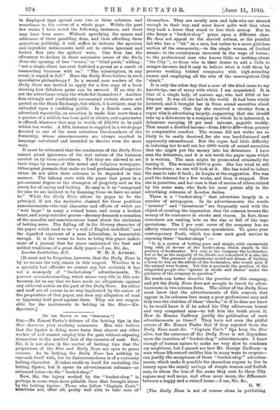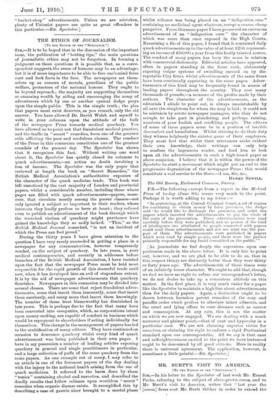[To THE EDITOR OF THE " SPECTATOR."] Sin,—Mr. Ernest Parke's
defence of the betting tips in the Star deserves your scathing comments. Men who believe that the tipster is doing more harm than almost any other worker of evil cannot employ him for gain without exposing themselves to the merited lash of the enemies of cant. But, Sir, it is not alone in the matter of betting tips that the proprietors of the Star and Daily News are open to grave censure. As to betting, the Daily News has nothing to reproach itself with, but its disinterestedness is of a curiously halting character. It takes credit to itself for excluding the betting tipster, but it opens its advertisement columns—at enhanced rates—to the " bucket-shop."
Now, Sir, the injury worked by the " bucket-shop " is perhaps in some ways more pitiable than that brought about by the betting tipster. Those who follow "Captain Coe's " selections are, after all, pretty well able to take care of themselves. They are mostly men and lads who are shrewd enough in their way, and must know quite well that when they back a horse they stand to lose their money. But he who keeps a " bucket-shop " preys upon a different class. He does not appeal to the shrewd artisan, or the pnshful lad who has a " bit" on a race, but rather to a more guileless section of the community,—to the single woman of limited means ; to the countryman unversed in the ways ef towns ; to the professional man who knows little or nothing about " the City "; to those who in their desire to add a little to meagre incomes find it easy to believe what is told them by persons working behind companies with high-sounding names and employing all the arts of the unscrupulous City "shark."
It is only the other day that a case of the kind came to my knowledge, one of many with which I am acquainted. It is that of a single lady, of mature age, who had £800 at her disposal. It was all she had in the world. It had been wisely invested, and it brought her in from sound securities about £40 per annum. One day she received a circular from a rogue who is advertising largely, suggesting that she should take up a debenture in a company in which he is interested, a debenture carrying 10 per cent. interest, payable weekly. That meant a doubled income—from £40 to £80—from penury to comparative comfort. The woman did not strike me as likely to be easily deceived, for she was hard-featured and apparently unemotional. But the rogue bad little difficulty in inducing her to sell out her £800 worth of sound securities that she might put the money into his debenture. I have
seen the debenture, and it is not worth the paper upon which it is written. The man might be prosecuted criminally for issuing it. The woman's £800 is gone. She has tried to sell the debenture; no one will look at it. She has tried to induce
the man to take it back ; he laughs at the suggestion. She was paid the interest for a few weeks, and then it stopped. Now she is penniless, and her case is that of scores of others ruined by the same man, who finds his most potent ally in the advertising columns of London dailies.
There is a " bucket-shop " that advertises largely in a number of newspapers. In its advertisements the words " investor " and "investment" are frequently used with the object of creating the impression that the concern invests the money of its customers in stocks and shares. In fact, these customers are making bets on the rise or fall of the tape quotations. The 1 per cent. cover of the company has no affinity whatever with legitimate speculation. To quote your contemporary Truth, which has done such good service in exposing these " bucket-shops "
"It is a system of betting pure and simple with enormously long odds in favour of the bucket-shop, which stands in the position of bookmaker. Not only is the company the bookmaker, but so far as the majority of its clients are concerned it is also the tipster. The greenest of greenhorns would not dream of backing a horse to win on the advice of the bookmaker, who would gain if the animal were beaten. Yet this is precisely the position of the misguided people who operate in stocks and shares' under the guidance of the company in question."
No words can better describe the practice of this company, and yet the Daily News does not scruple to insert its adver- tisements in two-column form. The editor of the Daily News must know that the advertisements of this concern that appear in its columns lure many a poor professional man and lady into the clutches of these "sharks," or if he does not know it, he would know it if he asked his City editor—an honest
and very competent man—to tell him the truth about it. How do Messrs. Cadbury justify the publication of such advertisements as these ? They have not even the pitiful excuse of Mr. Prnest Parke that if they rejected them the Daily News must die. " Captain Coe's " tips keep the Star alive, but the existence of the Daily News is not dependent upon the insertion of " bucket-shop " advertisements. I know enough of human stature to make the very glow to condemn my neighbour, but I cannot see how Mr. George Cadbury—A man whose life-record entitles him in many ways to respect-- can justify the acceptance of these " bucket-shop " Advertise- ments, 'which make it possible for shameless rogues to lite in luxury upon the scanty savings of simple women and foolish men, to whom the loss of the sums they sent to these City rogues may well mean, and often must mean, the difference between a happy and a ruined home.—I am, Sir, &c.,
O. W.
[The Daay%Clews is not of course alone in publishing
" bucket-shop " advertisements. Unless we are mistaken, plenty of Unionist papers are quite as great offenders in this particular.—ED. Spectator.]















































 Previous page
Previous page